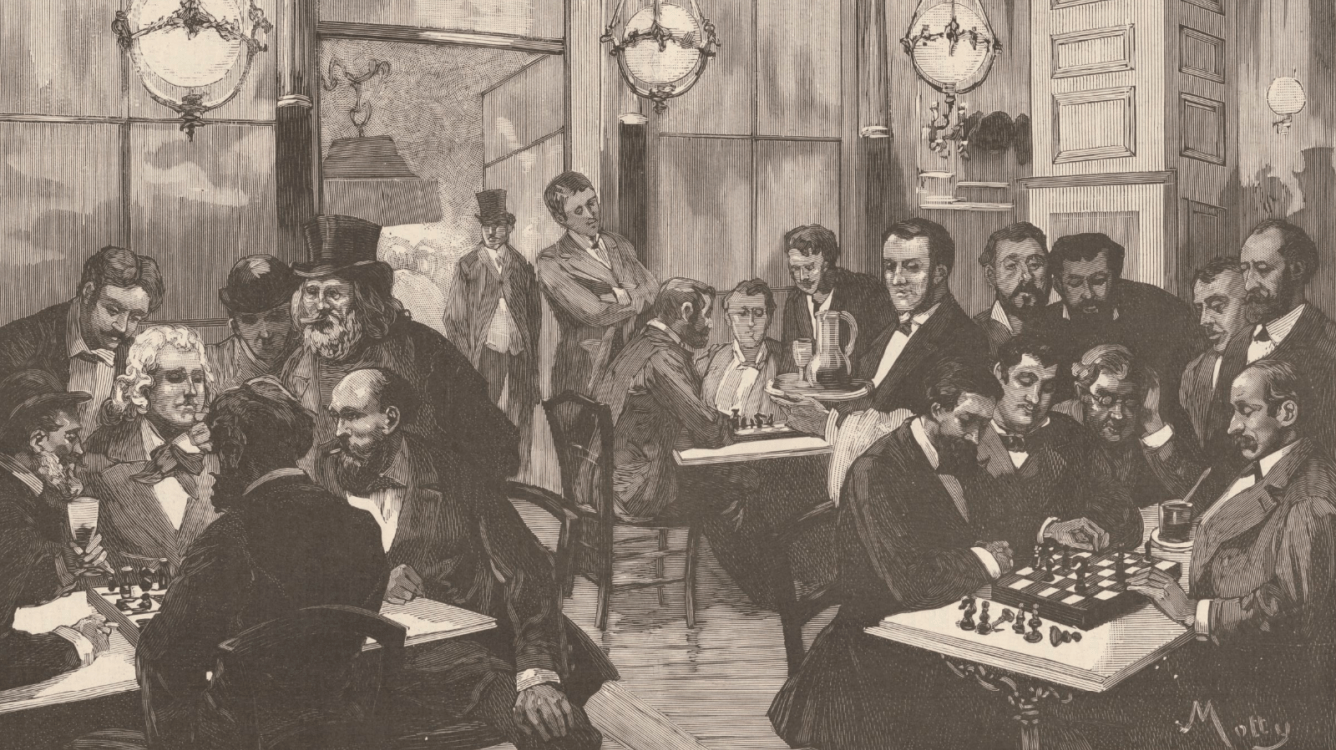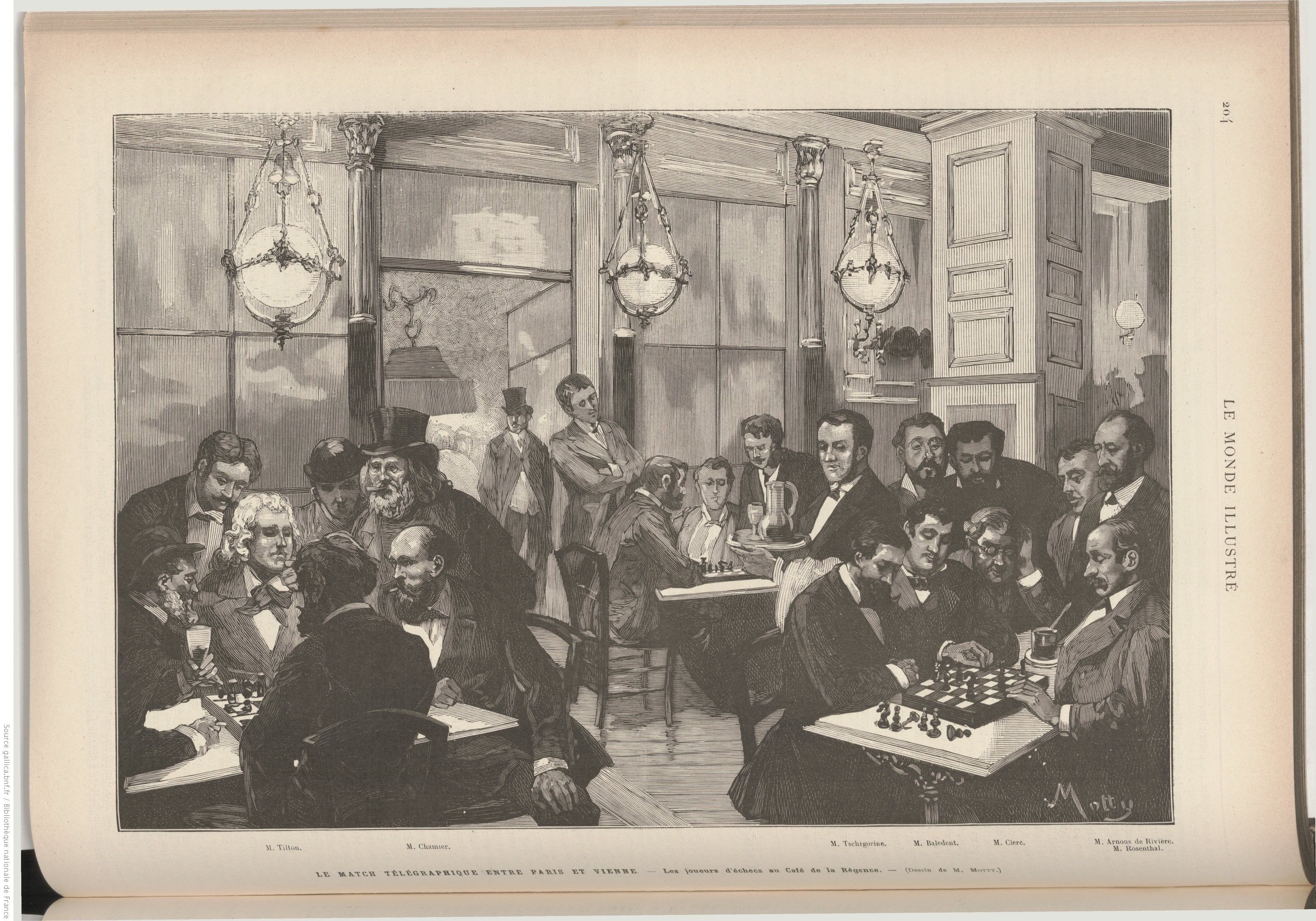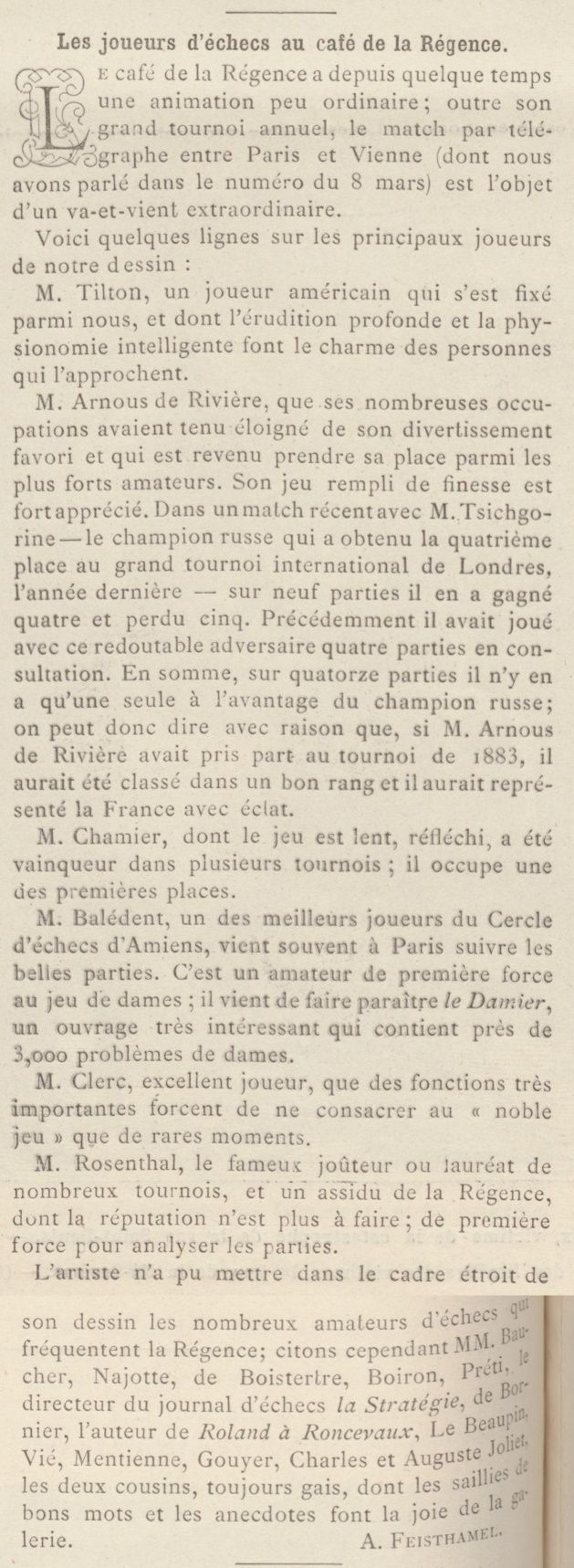
The chess players at the cafe de la Regence. Disagreements at the Paris - Vienna match of 1884-1885
During Feb 27, 1884 - Oct 27, 1885 a correspondence by telegram chess match of two games took place, between the Cercle de la Regence [of the famous cafe] and the Vienna chess club. At stake were 2.000 francs by each side. For Paris they started playing Jules Arnous de Rivière, Edward Chamier, Albert Clerc and Samuel Rosenthal. But after 18th move, first three submitted their resignation cause of a disagreement with the Paris committee, leaving Rosenthal leading a group of the best amateur players of the Cafe de la Regence. But we'll come back at this...
A month after the games started, an article appeared at Le Monde Illustré [from which the head drawing], presenting the chess players of the Cafe...


translation:
The chess players at the café de la Régence.
The Café de la Régence has for some time a not so common activity; besides its big annual tournament, the telegraph match between Paris and Vienna (about which we've talked in the issue of Mar 8) is the object of an extraordinary back and forth.
Here are some lines on the main players of our drawing:
Mr. Tilton, an American player who has settled among us, and whose deep education erudition and intelligent physiognomy charm those who approach him.
Mr. Arnous de Rivière, whom his numerous occupations had kept away from his favorite entertainment and who returned to take his place among the strongest amateurs. His play full of finesse is highly appreciated. In a recent match with Mr. Chigorin - the Russian champion who took the fourth place at the big international tournament in London last year - in nine games he won four and lost five. Previously he had played with this formidable opponent four games in consultation. In short, out of fourteen games there is only one to the advantage of the Russian champion; we can therefore rightly say that, if Mr. Arnous de Rivière had taken part in the 1883 tournament, he would have been classified in a good rank and he would have represented France with brilliance.
Mr. Chamier, whose game is slow, cautious, has won in several tournaments; he occupies one of the first places.
Mr. Badelent, one of the best players in the chess circle of Amiens, comes often in Paris to follow [watch] the good games. He is a first-rate amateur at the game of draughts; he has just published the Damier, a very interesting work which contains nearly 3.000 problems of draughts.
Mr. Clerc, excellent player, that very important jobs force him to devote himself to the "noble game" only rare moments.
Mr. Rosenthal, the famous duelist or winner of numerous tournaments, and a regular at la Regence, who needs no introduction; of first strength to analyze the games.
The artist couldn't place in the narrow frame of his drawing the numerous amateurs of chess who frequent at La Regence; yet let us name MM. Baucher, Najotte, de Boistertre, Boiron, Preti, director of the chess journal La Stratégie, de Bornier, the author of Roland à Roncevaux, Le Beaupin, Vié, Mentienne, Gouyer, Charles and Auguste Joliet, the two cousins, always cheerful, whose witty words and anecdotes make the gallery happy.
A. Feisthamel
*The translations maybe aren't the best but I hope that they are clean and understandable.
For Vienna chess club [Wiener SchachGesellschaft] eight players seem that participated, from which Dr. Julius Kleeberg possibly was the less famous. Max Weiss & Jacques Schwarz were known good players, while Berthold Englisch & the Fleissig brothers [Bernhard & Max] even more renowned. And two more that attracted my attention... firstly Dr. Philipp Meitner, known for the Immortal Draw game vs Carl Hamppe within Vienna 1872. Then Dr. Franz Brentano, a philosopher - psychologist, teacher of Husserl and Freud, known in the chess world mostly for his opening theory contribution, the Brentano gambit or defense in the Ruy Lopez, 3...g5 [WSZ 1900, 97]. There was also some first suggestion in the press that Ignaz Kolisch & Adolf Csank would participate, but soon it was refuted [Ignaz Kolisch by Fabrizio Zavatarelli, p. 326].

|

|
The two games were published in Le Monde illustré of Nov 21 & Dec 12 1885, with really extended comments by Samuel Rosenthal. At the beginning of the first game the following summary was written...

translation:
Played by correspondence, between the Paris Chess Circle and the Vienna Chess Club, from February 27, 1884 to October 27, 1885.
The Players Committee was composed for Paris by Messrs Arnous de Rivière, Charnier, Clerc and Rosenthal; from the 18th move, Messrs Arnous de Rivière, Charnier and Clerc having submitted their resignation after a disagreement with the circle committee, the Cercle des Chess of Paris has entrusted the direction of the two games to Mr. Rosenthal with the collaboration of the strongest amateurs of the Circle. On the Vienna side, the players were Messrs Professor Brentano, B. Englisch, B. Fleisig, Dr Flessig. Dr Kleberg, Dr Meitner, J. Schwarz and Max Weiss.
The stake was 2.000 francs for each side. A move was made every four days; each side could use the saved time of the played moves, nevertheless the extreme limit between the receipt of the opponent's move and the response could not exceed seven days.
The moves were sent by telegraph and confirmed by a registered letter.
A two-month suspension for the holidays took place from July 15 to September 15.
At the end of the games the reserve days were:
Paris 101 days
Vienna 65 ...
According to the previous issue of Nov 7, the Vienna chess club proposed to abandon the English opening game [2nd] if Paris would accept to abandon the Spanish one. And the proposition was accepted...

The aforementioned disagreement of the 18th move is described in the Rosenthal's comments of the first game. Also some were given in the Steinitz's International Chess Magazine [v.2 1886, p.30]. Rosenthal's extended comments on two moves [14th and 18th] with some additions by ICM, are given fully in the pgn.
But being really long let's summarize: According to Rosenthal, for the 18th move there were two options on the table, 18. Qh5, favored by Rosenthal, & 18. O-O-O, favored by the rest three players. In the end Rosenthal seems that convinced the rest, and having already agreed for a 2-month pause of the game, left Paris without sending the move. Some days later he was informed that the rest three sent an other 3rd move, 18. Be6, action that triggered their resignation. Rosenthal doesn't give the reasons for these actions, but maybe there's some idea of it in the comments of a former move, 14th. There an other disagreement occurred and by vote Rosenthal's opinion wasn't followed. What attracted my attention is that for this, Rosenthal, submitted an official protest. Wouldn't be enough just to record the votes?!? I think that there was already some dispute among the players... or maybe there was some pressure as the stake could be considered big!
_
The two games of the match with a clean multi-pgn just to enjoy...
_
... thanx for reading!
